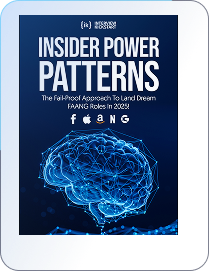PySpark interview questions are typically asked at data interviews where companies evaluate candidates on their knowledge of big data tools and frameworks. PySpark is essentially an open-source Python API for Apache Spark. It is a distributed computing framework containing a set of libraries, used widely for large-scale and real-time data processing of data.
We’ve listed these common PySpark interview questions for freshers and experienced professionals to give you an idea of what to expect at your interview. Knowing how to use the framework is a big bonus in data and software engineering interviews and can tile the odds in your favor.
If you are preparing for a tech interview, check out our technical interview checklist, interview questions page, and salary negotiation e-book to get interview-ready!
Having trained over 11,000 software engineers, we know what it takes to crack the most challenging tech interviews. Our alums consistently land offers from FAANG+ companies. The highest ever offer received by an IK alum is a whopping $1.267 Million!
At IK, you get the unique opportunity to learn from expert instructors who are hiring managers and tech leads at Google, Facebook, Apple, and other top Silicon Valley tech companies.
Want to nail your next tech interview? Sign up for our FREE Webinar
Let’s go ahead and look at some common Panda interview questions asked in technical interviews.
Let’s go ahead and look at some common PySpark interview questions for freshers and experienced professionals. We’ll also look at some frequently asked questions around the Python framework.
Here’s what we’ll cover in this article:
PySpark is a big data framework tool for Python that helps to perform large-scale data processing, analysis, and manipulation. The tool offers many benefits to developers and data professionals, as it is equipped with an extensive library with functions capable of performing a wide range of tasks.
Some notable benefits of using PySpark include:
If you’re a fresher applying for a Python developer or data analyst role, being able to answer common PySpark interview questions is essential from an interview perspective.
To give you an idea of the type of questions asked, below are some common PySpark interview questions.
Experienced Python programmers, developers, data engineers, data scientists, and analysts are expected to know their way around PySpark. If you’re an experienced tech professional, you can expect quite a few PySpark interview questions for experienced professionals at tech interviews.
Here are the top questions to give you context about the questions to expect.
Practicing these above PySpark interview questions can help you prepare for your upcoming technical interview. For specific coding-related problems for technical interviews, check out our Problems Page.
If you want to crack your next software developer interview, register for our Full Stack Masterclass to find out how we can help you. Interview Kickstart is the gold standard in tech interview prep.
Our programs include a comprehensive curriculum, unmatched teaching methods, FAANG+ instructors, and career coaching to help you nail your next tech interview.
Check out some reviews from our students to understand how we’ve shaped the careers of thousands of engineers by helping them land high-paying offers from the biggest tech companies.
PySpark is an open-source, cluster-computing framework integrated into Apache Spark. It helps to perform large-scale data analysis and processing by offering a wide set of libraries that help developers and analysts to perform complex data-related functions.
Practicing PySpark interview questions is crucial if you’re appearing for a Python, data engineering, data analyst, or data science interview, as companies often expect you to know your way around powerful data-processing tools and frameworks (like PySpark).
Roles that require a good understanding of PySpark include – data engineering, data scientist, data analyst, big-data, and Python developer.
Some benefits of PySpark are – i) it offers a huge set of libraries, ii) it can be integrated with 3rd party applications, iii) it allows for swift data processing, up to 10x faster than traditional frameworks iv) it is easy to use.
Some industrial applications of PySpark include – Real-time media streaming, Financial analysis, processing healthcare information and analyzing healthcare records, in-app travel and e-commerce recommendations, and telecommunication services.
Related Reads:Â
1. 100+ AWS Interview Questions for Tech Interview Preparation
2. Top iOS Interview Questions and Answers You Should Prepare
3. Java OOPs Interview Questions to Crack Coding Interviews
4. Database Management System (DBMS) MCQs for IT Specialists
5. Artificial Narrow Intelligence: Examples, Challenges, and Types
Attend our free webinar to amp up your career and get the salary you deserve.

693+ FAANG insiders created a system so you don’t have to guess anymore!

100% Free — No credit card needed.

Time Zone:






Get your enrollment process started by registering for a Pre-enrollment Webinar with one of our Founders.

The 11 Neural “Power Patterns” For Solving Any FAANG Interview Problem 12.5X Faster Than 99.8% OF Applicants
The 2 “Magic Questions” That Reveal Whether You’re Good Enough To Receive A Lucrative Big Tech Offer
The “Instant Income Multiplier” That 2-3X’s Your Current Tech Salary

The 11 Neural “Power Patterns” For Solving Any FAANG Interview Problem 12.5X Faster Than 99.8% OF Applicants
The 2 “Magic Questions” That Reveal Whether You’re Good Enough To Receive A Lucrative Big Tech Offer
The “Instant Income Multiplier” That 2-3X’s Your Current Tech Salary
Just drop your name and email so we can send your Power Patterns PDF straight to your inbox. No Spam!
By sharing your contact details, you agree to our privacy policy.
Time Zone: Asia/Dhaka

We’ve sent the Power Patterns PDF to your inbox — it should arrive in the next 30 seconds.
📩 Can’t find it? Check your promotions or spam folder — and mark us as safe so you don’t miss future insights.
We’re hosting a private session where FAANG insiders walk through how they actually use these Power Patterns to crack interviews — and what sets top performers apart.
🎯 If you liked the PDF, you’ll love what we’re sharing next.
Time Zone:

